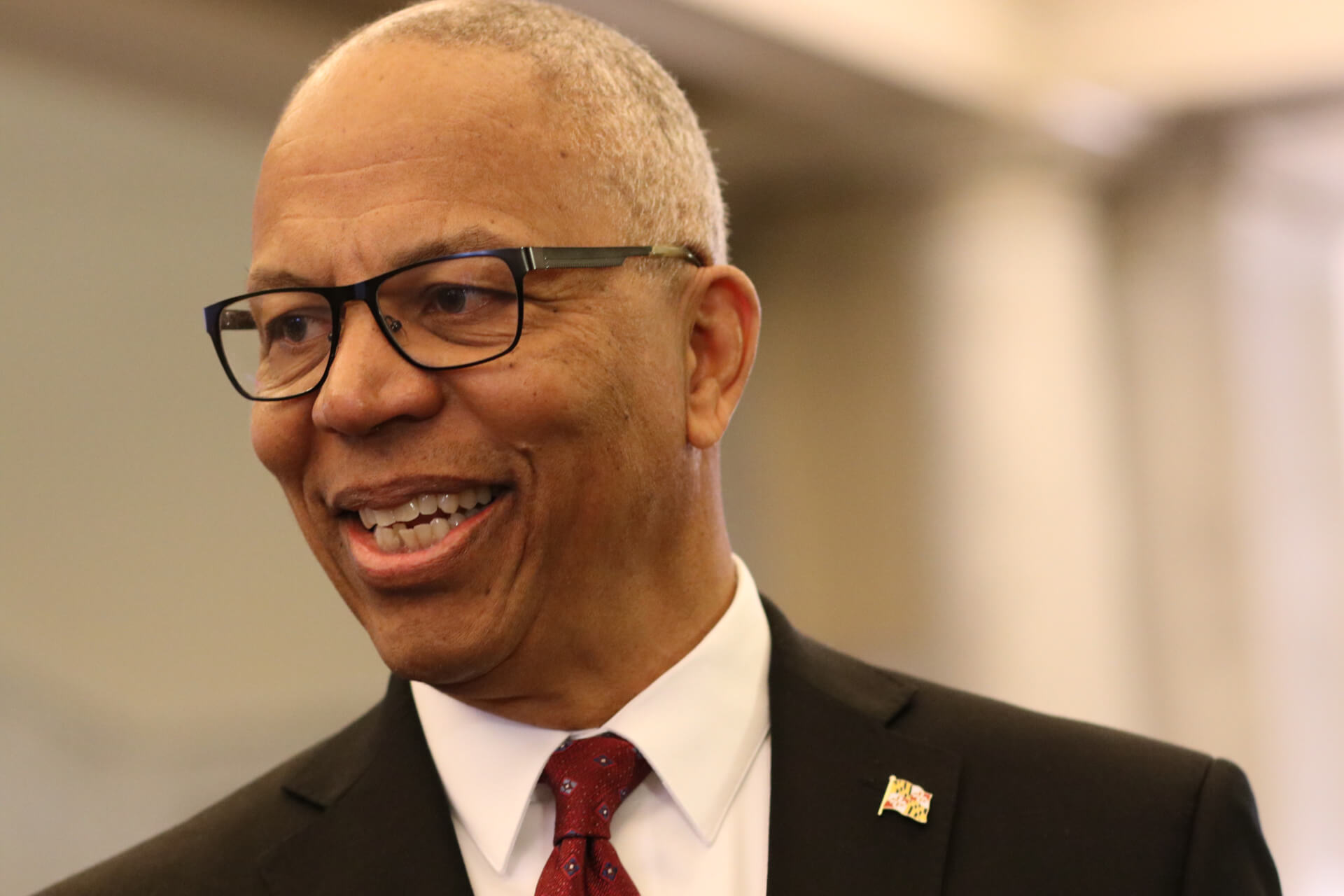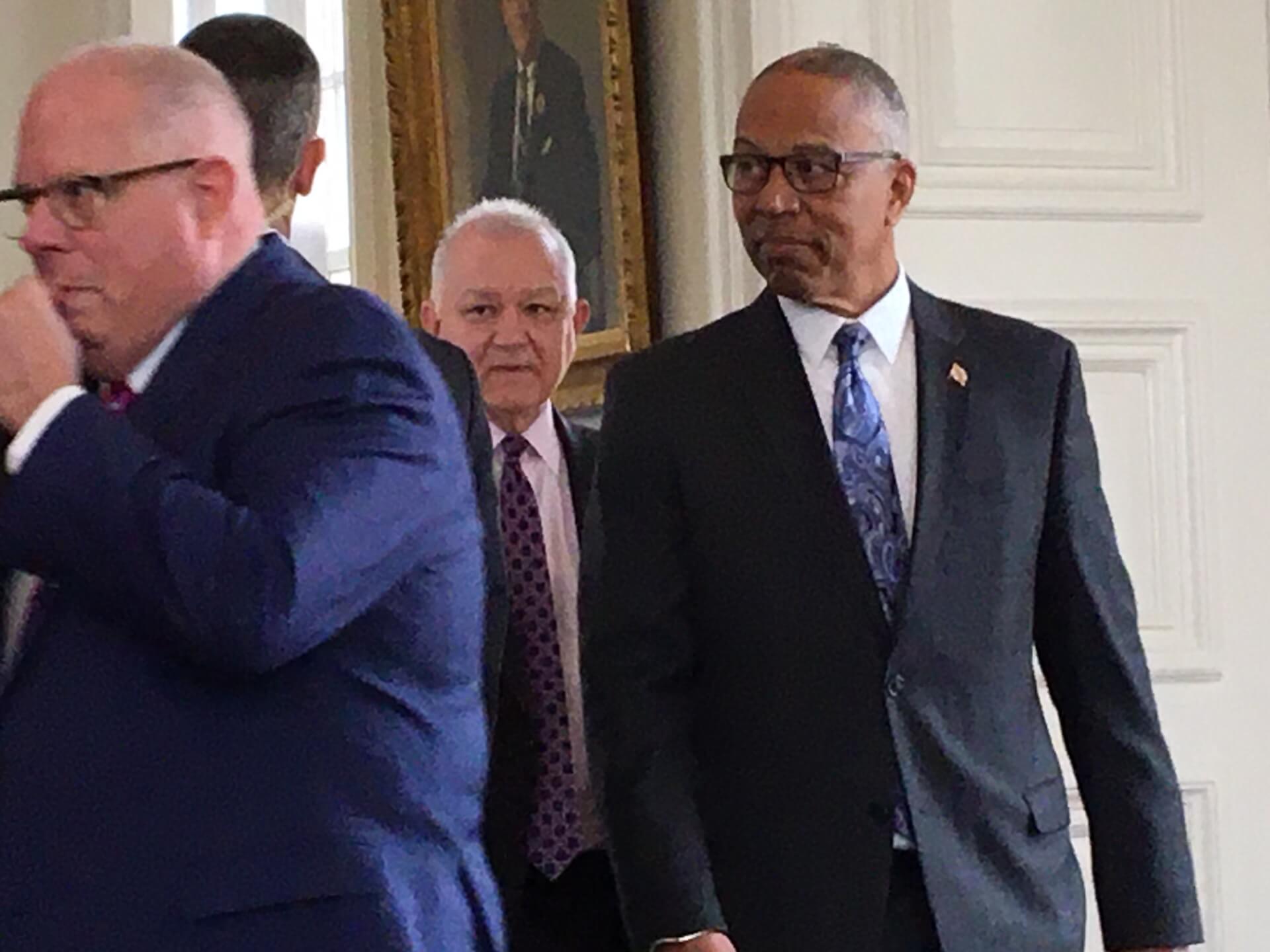
No one who knows Boyd K. Rutherford would tap him to entertain a crowd, current and former colleagues agree.
But if Gov. Lawrence J. Hogan Jr. (R) was looking for a seasoned, capable insider to take the reins of state government during the COVID-19 epidemic, these same people say, he couldn’t have found a better person than Maryland’s lieutenant governor.
Rutherford took over day-to-day control of the non-COVID-19 portions of the government on March 12, so Hogan could focus entirely on the health crisis. (At the time, Maryland had just recorded its 12th case.)
By all accounts, the transition was seamless.
As head of the Department of General Services for former Gov. Robert L. Ehrlich Jr. (R), and a former Assistant Secretary for Administration at the U.S. Department of Agriculture before that, Rutherford is steeped in the daily operation of government.
Current and former colleagues say he is driven by a genuine desire to deliver services as efficiently as possible.
“Boyd is a nuts and bolts guy,” said state Sen. Stephen S. Hershey Jr. (R-Upper Shore). “He definitely is the appropriate person for doing exactly what the governor has him doing right now, and that’s running the state.”
Hershey said he and Rutherford worked together on a big project during the Ehrlich administration, when the former was assistant secretary in the Department of Planning.
“He’s that quintessential chief operating officer type,” Hershey said this week. “The governor goes out and he’s the face of the state, and Boyd is the guy who sits behind the scenes and makes things happen.”
Rutherford’s resume is a dizzying array of commissions, boards and councils — everything from the health of the Chesapeake Bay to procurement reform to school construction to economic development. And on and on.
He was perhaps best known, up until his recent change in duties, for his work overseeing the state’s response to the heroin and opioid epidemic, which he expanded to include mental health issues.
During an interview in November in his spacious State House office, months before the COVID-19 crisis hit, Rutherford said he was “particularly proud to get [mental health] out of the shadows, to try to get relief to families.”
From D.C. Democrat to Maryland Republican
Boyd Kevin Rutherford, who was born 63 years ago on April 1, grew up in Northeast Washington, D.C. “I had the regular D.C. kid life, making mistakes,” he said of his youth, quickly adding: “Not permanent mistakes.”
The city was mostly black then, though discrimination was commonplace.
“In the early 60s, my parents couldn’t take me to a restaurant in parts of downtown D.C.,” he said. “It was still segregated.”
(Discrimination wasn’t limited to his youth: “When I worked at the Department of Agriculture, there were still people there who would tell me that blacks couldn’t eat in the cafeteria. And they were still working there.”)
Rutherford attended public school until the 8th grade, then Archbishop Carroll High School. He studied economics and political science at Howard University before heading west, where he received both his masters in communications management and his law degree from the University of Southern California.
In the early 1990s he returned to D.C. and practiced law for a while.
As a young adult, Rutherford was a Democrat. He remembers being moved by the Rev. Jesse Jackson’s oratory, but he eventually left the party.
“The Democratic Party, I felt — and I think it’s worse now — they treat African-Americans as victims. And I don’t see myself as a victim,” he said. “If a person goes through their life thinking they’re a victim, they’re always going to be angry. And there’s an unnecessary energy that is not spent bettering oneself.”
After moving to the suburbs, Rutherford started to get involved in politics, serving on the Howard County Republican Central Committee from 1996-2002 and as a delegate to the 2000 Republican National Convention.
‘He will tell you how the mouse trap is built’
Serving as head of DGS in the Ehrlich administration, from 2003 to 2006, brought him into contact with the granular details of how state government functions.
“He will tell you how the mouse trap is built,” Ehrlich recalled.
“He did a great job for us. I’m sure he’s doing a wonderful job for Gov. Hogan. He’s a very capable person. Once you learn about him, you’re happy that he’s in government.”
In a phone interview in late March, Rutherford described how his workload has shifted since he began to oversee state government.
“Some of the routine decisions that he would make are being presented to me,” he said.
Certain personnel decisions, applications for federal grants and regulatory matters now cross his desk as well. In addition, he will chair the three-person Board of Public Works — via teleconference, of course — until things return to normal.
Rutherford used to travel the state frequently, hitting the sorts of events that merited someone from the administration but weren’t gubernatorial level.
When he chairs meetings in the field, he is professional, polite and very low key. His attempts at humor receive dutiful laughter. (“What you see is what you get,” Ehrlich observed.)
The revisions to his portfolio and the health crisis mean he now has very few events outside the office. Meetings and conference calls jam his schedule, often back-to-back.
And he remains a sounding board for Hogan. “The governor still does want my input on certain areas,” he said.
During the interview in his office last fall, Rutherford said he is often the person to relay an “ask” from a county official or legislator to the governor.
“They know I have influence but I don’t have power,” he acknowledged. “And there are times when I will tell them, ‘You’re on the wrong path’ or ‘That’s not going to happen.’”
The lieutenant governor also said his one-on-one interactions with Hogan give the chief executive a chance to step off-stage.

Lt. Gov. Boyd K. Rutherford (right) and members of Gov. Lawrence J. Hogan Jr.’s cabinet follow the governor into a news conference several weeks ago. Photo by Bruce DePuyt
“It can be an opportunity for him to talk about whatever he wants, to just relax,” he said. “Because I don’t report to him. I’m not part of his staff. We can talk about family, our married life, our children, what’s going on, how we feel, the political back and forth.”
“It gives him someone else to talk to. We’ve known each other for a long period of time.” (Hogan was also a cabinet official in the Ehrlich administration.)
The coronavirus outbreak isn’t the first crisis they’ve fought together. Shortly after Hogan was sworn in, he was diagnosed with Non-Hodgkin’s lymphoma and riots erupted in Baltimore City following the death of Freddie Gray.
Hogan is term-limited, and GOP leaders will soon be looking to Rutherford for clues about whether he intends to run for governor in 2022.
The LG dismisses such questions, claiming he doesn’t have to decide for another two years. When pressed by a reporter, he quickly retreats, acknowledging that that’s not how the political calendar works.
“I guess you’re right,” he allows. “I get the question all the time. We’ll see.”
Rutherford noticeably upped his political appearances in 2019. But there obviously won’t be any for the foreseeable future. If he does run, he can plausibly tell voters that he’s already served as governor — at least for a while.
Whatever decision Rutherford makes about 2022 will be in consultation with his wife, two adult daughters and one adult son.
(“I have a daughter who just canceled her wedding” due to the public health crisis, he told WBAL-TV recently. “So you can imagine the stress that she’s under, which puts it on my wife, which then sometimes makes it to me.”)
In the meantime, there is little opportunity to think about the future when the demands of the present have such clear life-or-death consequences.
Rutherford associates say residents need not worry about the day-to-day operation of the administration while the governor is focused on the crisis.
Said Hershey, the state senator: “While all this stuff is going on with the coronavirus, the state of Maryland is in good hands right now.”
A NOTE TO OUR READERS
In these uncertain times, we’re here for you. We have a page dedicated to our reporting on COVID-19 in Maryland. We’ll continue to report with an eye toward the humanity of our sources and a commitment to public accountability.
Stay informed by signing up for the Maryland Matters Memo — our daily morning news roundup, delivered to your inbox. Free.
And if you are able, please consider a tax-deductible contribution to support our nonprofit newsroom.
We’re burning the candle at both ends — doing all we can to keep ourselves, and everyone else, as safe as possible — as we keep you informed.
Please take care!




 Creative Commons Attribution
Creative Commons Attribution